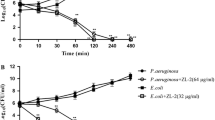Abstract.
Cathelicidins are a class of gene-encoded antibiotics found exclusively in mammals. In vitro and in vivo studies indicate they are effector molecules of mammalian innate immunity that can provide a first line of defense against an array of micro-organisms. Additional functions are described for some members of this class of antimicrobial peptides including chemotactic activity, mitogenesis, and angiogenesis. Therefore these peptides are considered to be multifunctional effector molecules. This review discusses recent progress in cathelicidin research and the functional properties of cathelicidins. Current work in this field suggests that understanding this component of the mammalian innate immune system and related natural antibiotic peptides offer an opportunity for the development of novel therapeutic agents with which to battle the continued problem of antimicrobial resistance.
Similar content being viewed by others
Author information
Authors and Affiliations
Additional information
Electronic Publication
Rights and permissions
About this article
Cite this article
Zaiou, M., Gallo, R.L. Cathelicidins, essential gene-encoded mammalian antibiotics. J Mol Med 80, 549–561 (2002). https://doi.org/10.1007/s00109-002-0350-6
Received:
Accepted:
Published:
Issue Date:
DOI: https://doi.org/10.1007/s00109-002-0350-6



